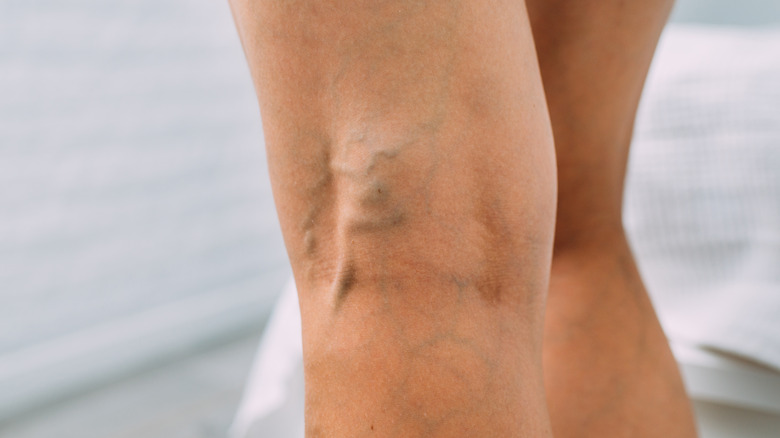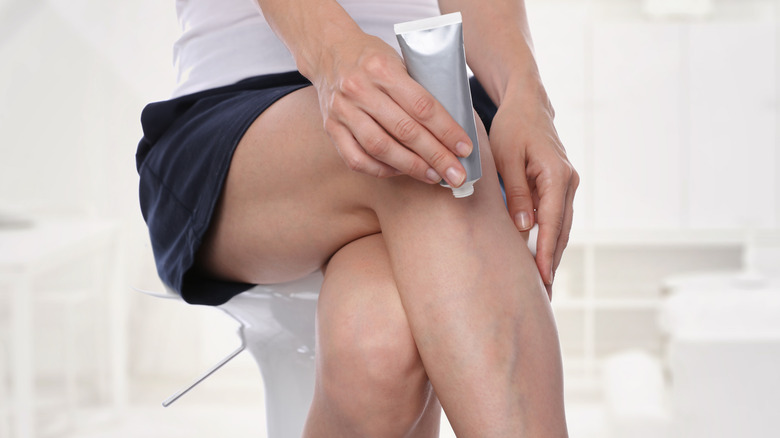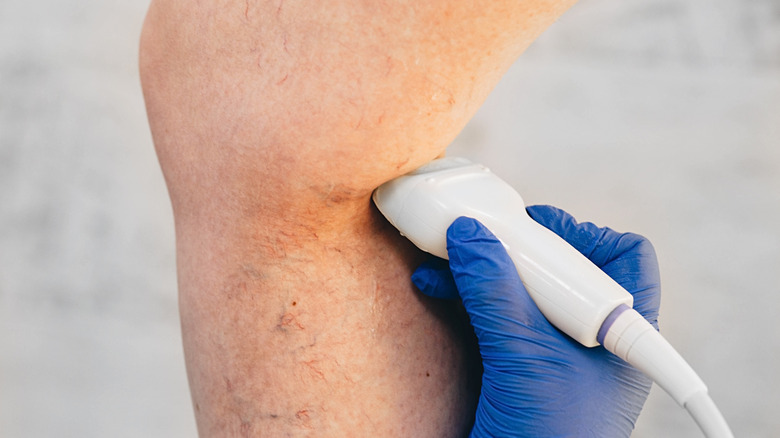Can Vitamin K Help Reduce The Appearance Of Varicose Veins?
Appearing purple or blue in color just below the skin's surface, varicose veins are the product of swollen blood vessels that cause the vein to bulge beyond the shape of a normal vein (via Cleveland Clinic). Most commonly, varicose veins are found on the lower extremities, such as the ankles, legs, or feet.
Older adults, people who are pregnant, or those with a family history of the condition may be at an increased risk for developing varicose veins. In addition, factors such as smoking, a sedentary lifestyle, excess weight, or certain health conditions may also increase one's chances of varicose veins.
For some people, varicose veins can prompt symptoms of pain or itchiness. For others, they may be primarily more of an aesthetic concern. Although treatment methods are available, some people look for at-home remedies they can implement to help reduce the appearance of varicose veins. Is it possible that vitamin K could be one such treatment?
Vitamin K may support vascular health
Varicose veins appear in the first place as a result of weakening in the vein's wall. This can stem from wearing restrictive clothing, hormonal changes, or simply from growing older. As this happens, increases in blood pressure prompt the vein walls to expand, making it more difficult for blood flow to move in the direction it should be. When that blood flow backs up or accumulates in the veins, the result is the signature bulging that characterizes varicose veins.
Vitamin K serves the body in a variety of ways, including bone strengthening and enabling the body's blood clotting abilities (per Harvard T.H. Chan). Because vitamin K plays a role in the health of our blood, it's logical to think that it may help lessen the visibility of varicose veins. After all, you can find vitamin K creams sold on drugstore shelves designed as a topical product specifically for our skin.
"By improving the elasticity of blood vessels and overall vascular health, vitamin K can help with a handful of leading aging factors, including the appearance of stretch marks, varicose veins, bruising, undereye puffiness, dark circles, and other conditions that have a vascular component," New York City board-certified dermatologist Dr. Sejal Shah told Real Simple. However, not all experts seem to agree with this notion.
Vitamin K may not be the most effective treatment for varicose veins
While vitamin K may support our blood health, some experts feel that it won't do much in the way of reducing the appearance of varicose veins. The reason being is that varicose veins are considered a venous disease. According to the Center for Vein Restoration, vitamin K is not considered an effective method for treating the underlying cause responsible for the condition: blood backflow.
Also a venous disease, spider veins can look similar in color to varicose veins. Dr. Neal Reynolds, the founder of the Vein Clinic in South Carolina, told Prevention that in his time as a physician, he couldn't cite a single case in which a patient was able to lessen the appearance of spider veins by boosting their vitamin K intake or through the use of a topical vitamin K product. "We have no evidence that vitamin K improves vein health," Dr. Reynolds told the publication.
Instead, minimally-invasive procedures such as sclerotherapy or ablation are considered to be more effective treatment methods for reducing the appearance of both spider veins and varicose veins. While it is possible that the use of vitamin K after the fact may help lessen bruising following the procedure, the nutrient cannot treat varicose veins solely in and of itself.



